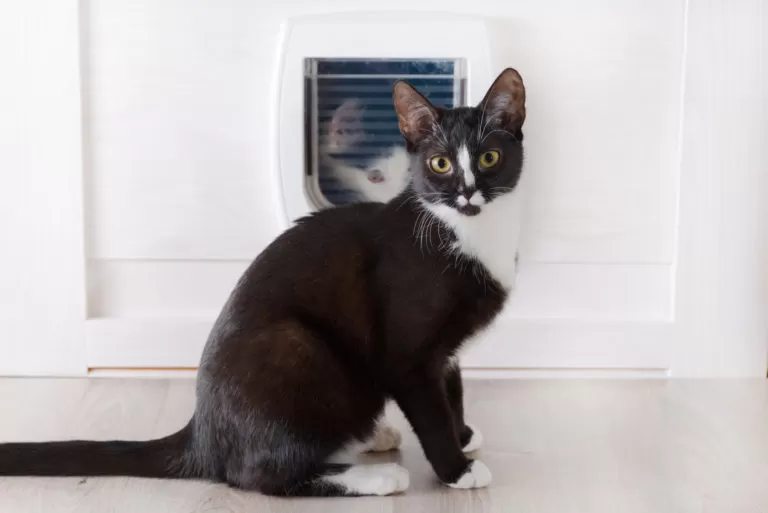A garage door that randomly opens and closes by itself can be both an inconvenience and a safety concern. This mysterious behavior often has a logical explanation and a straightforward solution. Here are the key areas to investigate if your garage door is acting on its own:
Garage Door Transmitters
Wall Control
- The wall control inside your garage could be malfunctioning. Over time, dirt and dust can accumulate, causing the buttons to stick. Additionally, if the wiring behind the garage door wall control is damaged or loose, it could send unintended signals to the opener.
- Solution: Inspect the wall control for any obvious signs of damage or dirt. Clean the buttons with a dry cloth and ensure the wiring is secure. If the issue persists, consider replacing the wall control unit.
Keypad
- An outdoor garage door keypad is another potential culprit. Exposure to the elements can lead to malfunction. Additionally, someone might have accidentally pressed the buttons, causing the door to open or close.
- Solution: Check the garage keypad for any signs of damage or wear. Ensure it is clean and dry. If you suspect someone might be accidentally activating it, consider resetting the keypad code.
Remote Control
- The remote control can also cause the garage door to behave erratically, especially if it is malfunctioning or has a stuck button.
- Solution: Examine the remote control for stuck buttons or signs of damage. Replace the batteries if needed.
Garage Door Control Wiring
Over time, the wall control wiring that connects to the garage door opener can become damaged due to wear and tear, rodents, or exposure to the elements. Faulty wiring between the garage door opener and the wall control unit can send erratic signals, causing the garage door to open and close on its own. Loose connections can also result in intermittent power supply or erratic signals being sent to the opener, causing the door to open or close unexpectedly.
Solution: Start by inspecting the wires that connect the wall control, keypad, and safety sensors to the garage door opener. Ensure all connections are secure and tight, as loose connections can lead to intermittent power supply or erratic signals. Additionally, inspect the wiring for any visible signs of damage. If you notice any frayed or exposed wires, they need to be repaired or replaced by a professional.
Electrical Circuit
Power surges, voltage fluctuations, or general electrical issues in your home’s wiring can affect the garage door opener. Power surges can momentarily overload the garage door opener’s control board, causing it to misinterpret signals and activate the door. Voltage fluctuations might also lead to inconsistent power supply, making the opener think it has received a command to open or close.
Solution: Begin by inspecting the circuit breaker panel to ensure that no circuits are tripped or fuses are blown. Look for any signs of electrical damage such as frayed wires, scorch marks, or loose connections in the wiring that supplies power to your garage door opener. Consider installing a surge protector specifically designed for garage door openers. This can help protect the unit from electrical surges. If the problem persists, consult an electrician to inspect your home’s wiring.
Neighbors
In some cases, neighbors who have garage door openers on the same frequency could inadvertently be opening your door. Older garage door openers typically used fixed codes, meaning the remote always sent the same signal to the opener. If your neighbor’s remote uses the same fixed code as yours, it could operate your garage door. Modern openers use rolling codes, which change the signal each time the remote is used, significantly reducing the chance of interference. However, some neighborhoods still have a mix of older and newer systems. This is more common in densely populated areas where homes are close together.
Solution: To rule out interference from other remotes, try reprogramming your remote and the garage door opener to a new frequency. This often involves pressing a specific button on the opener unit and the remote simultaneously. If your garage door opener is an older model, you could also consider upgrading to a new unit with rolling code technology. This will automatically change the code each time the remote is used, making it nearly impossible for a neighbor’s remote to interfere.
Opener’s Limit Settings

The limit settings on your garage door opener determine how far the door travels when opening and closing. If these settings are incorrect, the door might think it hasn’t fully closed or opened, causing it to reverse direction. Similarly, if the settings cause the door to hit the ground too hard or not close fully, the opener might react by reopening the door.
Solution: Refer to your garage door opener’s manual to adjust the limit settings. Make small adjustments and test the door’s operation until it functions correctly. Properly adjusting the limit settings ensures that the door operates smoothly and stops at the correct positions, preventing unintended movements.
Consider Professional Help
If you’ve gone through all the above steps and your garage door still opens and closes on its own, it might be time to call in a professional. A trained technician can thoroughly inspect your garage door system and pinpoint the exact cause of the problem.
Trust the experts at A Plus Garage Doors to diagnose and repair the issue quickly and efficiently. Our skilled garage door technicians provide fast, reliable repair service to ensure your garage door operates smoothly and securely. Contact A Plus Garage Doors today for professional solutions and peace of mind.
Conclusion
A garage door that opens and closes on its own is usually a sign that something needs attention. By systematically checking these potential causes, you can often identify and resolve the issue without too much trouble. If you’re unable to diagnose or fix the problem yourself, it’s always a good idea to consult a professional garage door technician to ensure your door operates safely and reliably.





